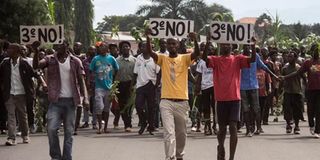Grim history repeats itself as Burundians back in Tanzania

Demonstrators protest against President Pierre Nkurunziza’s bid for a third term in power in Bujumbura on April 27, 2015. PHOTO | LANDRY NSHIMIYE |
What you need to know:
- Burundi's 13-year civil war, between ethnic Tutsis and Hutus, propelled refugees across the region.
- The war ended in 2006 but the last refugees only returned home last year, months before fresh unrest, this time political, rocked the country.
- Parliamentary elections are now slated for June 29, while the presidential poll is due on July 15.
NYARUGUSU, TANZANIA
Squeezed into a white canvas tent, Benoit Niragira sits with his wife and three children having fled unrest in his homeland Burundi for the safety of neighbouring Tanzania.
It is not the first time Niragira has become a refugee. This time he is in the crowded Nyarugusu camp, and feeling the bitter taste of a return to dark days he thought were over after he joined 100,000 other Burundians who have also fled political violence.
Burundi's 13-year civil war, between ethnic Tutsis and Hutus, propelled refugees across the region. The war ended in 2006 but the last refugees only returned home last year, months before fresh unrest, this time political, rocked the country over President Pierre Nkurunziza's decision to run for a controversial third term.
Parliamentary elections are now slated for June 29, while the presidential poll is due on July 15.
Aid workers fear the situation might deteriorate further in the small central African country, sending more Burundians packing and undoing years of work on repatriations and reconciliation.
Niragira, 30, knows all too well the tough life of a refugee: as a 12-year old boy he fled to Democratic Republic of Congo before moving onwards to Tanzania, when DR Congo too spiralled into civil war.
Finally, after Burundi's civil war began to wane, Niragira returned home in 2005, got married, and settled down.
"Now 10 years later I find myself in Tanzania," he said. "For now, there is no hope of return since our country is in chaos."
Some refugees say they are running from the Imbonerakure, the youth wing of Nkurunziza's party, a fearsome group whose name means "The Watchmen" or, literally, "Those Who See Far".
The Imbonerakure have a bloody reputation, with the United Nations and human rights groups branding them as little more than a militia and accusing them of working with security forces and of abuses including executions.
REFLEX TO FLEE
Since early April, more than 100,000 people have fled Burundi, the majority to Tanzania but others to Rwanda and DR Congo, according to the UN refugee agency.
At least 50,000 of them have found their way to Nyarugusu, nearly doubling the size of a camp that was already home to 60,000 Congolese refugees who have been here since 1996.
For Donavina Munduye, sitting among her nine children, the situation is all too familiar.
She spent over 10 years in a Tanzanian refugee camp before being repatriated in 2012.
"They forced us to return to Burundi, but on our arrival we had problems," she said, explaining she had refused to join Nkurunziza's ruling CNDD-FDD party.
For the thousands of Burundians who grew up in Tanzania, coming back is almost a "reflex" when tensions escalate at home, said Yorgos Kapranis, regional head of the European Union humanitarian aid department.
"It's where they feel safe," he said.
Tanzania had closed the refugee camps for Burundians, and last year agreed to offer citizenship to over 200,000 Burundians — a move hailed by the UN refugee agency as "unprecedented".
Tanzania, which also hosted hundreds of thousands of Rwandans during the 1994 genocide, had hoped that was the end of the refugee crisis.
"There is a huge disappointment, not only for Tanzania but also the international community," Kapranis said.
And still, the refugees continue to come.
"We welcome these refugees and have always welcomed them, but what we want is peace, so that the problems of Burundi do not come here," said Frederic Nisajilie, a Tanzanian local government official.
With no clear end to Burundi's crisis in sight the camp here is already stretched far beyond capacity.
Sanitary conditions are deteriorating, raising fears that the situation could get worse. A recent cholera epidemic killed 30 people before it was brought under control, but the risk of sickness remains.
For refugees like Niragira and Munduye the camps in Tanzania offer safety but little comfort.




